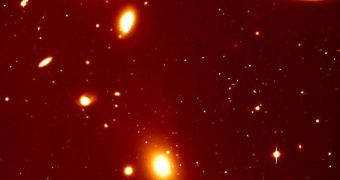Italian scientists from the Sapienza University in Rome propose that life developed a lot sooner in the Universe than we give it credit for. Currently, most scientists believe that the earliest lifeforms appeared here on Earth, but the new idea proposes that proto-life already existed in the Cosmos.
On our planet, life developed an estimated 9.6 billion years after the Big Bang exploded everything into being, but the Italian researchers say that earlier life proto-life forms developed a lot sooner, possibly within a few billion years after the Universe began.
This moment may have coincided with the emergence of dark energy as the dominant force in the Universe. At the same time, rapid stellar formation led to an increase in galaxy size, while supernova explosions seeded the Universe with massive amounts of chemicals heavier than hydrogen and helium.
According to current estimates, it took about 4 to 5 billion years after the Big Bang for dark energy to establish its domination over the entire Cosmos. This shift can also be registered in the Cosmic Microwave Background, which is the leftover radiation that the initial explosion left behind.
The temperature of the Universe decreased during the aforementioned interval, forcing matter to undergo significant phase transitions. In turn, these changes allowed matter to condense and form complex phases, which the Italian team say are related to the development of proto-life.
According to investigators, the transition from non-living to living matter occurs at temperatures ranging from 240 to 390 degrees Kelvin (-33 to 117ºCelsius, -27.4 to 242.6ºFahrenheit). As such, if other lifeforms exist, they may not resemble our own too much.
Extraterrestrial beings may be based on silicon, sulfuric acid or ammonia rather than carbon, and may sport completely different genetic codes, or none at all. They may not even be based on the specific combination of 20 amino-acids that characterizes life here on Earth.
Past studies have also suggested that life is as much as 10 billion years old. Naturally, the theories do not refer to life as we know it, but rather to its chemical and genetic foundations. The theory suggesting that life came to Earth from deep space is called panspermia.
The Italian team argues that the emergence of dark energy played a key role in underlying the origin and stability of living biological systems, even in their most primitive form. However, at this time, there is no way of knowing precisely how dark energy acted to accomplish this, Daily Galaxy reports.

 14 DAY TRIAL //
14 DAY TRIAL //